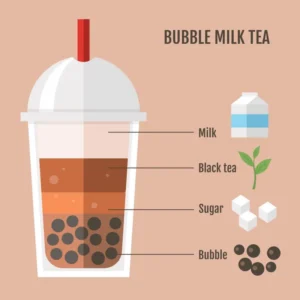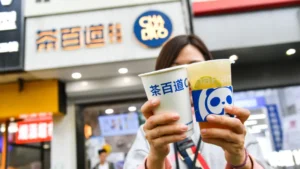Is the Bubble Tea Craze in China: The incredible journey of bubble tea, also known as boba, from its modest origins in 1980s Taiwan to its current position as a worldwide phenomenon is quite astounding. The distinctive combination of milky tea and chewy tapioca balls in this popular drink has won over the hearts of people all around the globe, especially those under the age of forty. They’ve probably had this delicious beverage before.
Despite the financial hurdles, bubble tea’s popularity remains unwavering. Two major bubble tea chains in China may have had lackluster stock market debuts, but they are not giving up. Additional share sales are in the pipeline, a testament to the enduring appeal of bubble tea. This beloved beverage continues to thrive, with a global fan base that spans from London to Helsinki, Buenos Aires to Cape Town.
Although its precise creators are still debatable, everyone agrees that bubble tea originated in Taiwan. The beverage has become incredibly popular near its birthplace in China, with an estimated half a million bubble tea businesses in the country alone.
University lecturer Lili from Guangzhou, China, remembers trying bubble tea for the first time in elementary school. She often indulges in it today, calling it an “easy-to-get pleasure.” Tina, a Beijing office worker, uses bubble tea every week and has been drinking it since she was a kid. She and her coworkers frequently place group orders from several popular restaurants.
Much of the success of China’s rapidly expanding bubble tea industry—worth around 145 billion yuan ($20 billion; £15.9 billion) last year—is attributable to innovation. The ongoing release of novel tastes and recipes has maintained market vitality and customer engagement, claims Jason Yu of consumer research firm Kantar Worldpanel. Like Lili, people who love drinking a lot are drawn to this technique because of the promotion campaigns and brand alliances that often offer new and fascinating flavors.
Many Chinese people still enjoy the inexpensive treat of bubble tea, even if the economy is slowing and consumer spending is becoming more stringent. Bubble tea continues to be a popular choice, regardless of the economy, due to the wide price range given by different chains.

Although the true inventor is still debated, we do know that bubble tea was invented in Taiwan GETTY
But investors’ excitement has been more subdued. There have been varied outcomes for the many Chinese bubble tea chains that have attempted to go public in an effort to cash in on the trend. Chabaidao, whose full name is Sichuan Baicha Baidao Industrial, had its stock market debut last month, but its stock price crashed the very first day it was listed. In a similar vein, the stock value of Nayuki, a chain based in Shenzhen, has fallen by over 80% since its IPO in Hong Kong over three years ago. These setbacks can be attributed to a combination of factors, including the negative mood in the Hong Kong market and the industry’s reliance on new shop openings to fuel revenue growth.
Broader market concerns, such as low confidence in the Hong Kong stock market (where new listings have dropped significantly since the beginning of the year), can be blamed for these companies’ lackluster stock results. Despite this, additional bubble tea chains are still looking to go public. Chinese retail giants Gaming Holdings and Mixue Group, ranked first and second, respectively, in terms of store count, have both applied to list on the Hong Kong Stock Exchange.
Economic analysts, such as Natixis senior economist Gary Ng, attribute the underwhelming market debuts primarily to the downbeat mood in the Hong Kong market. Bringing in new listings will be tough until we see more evidence of economic development in China and US borrowing rates go down. Some argue that the bubble tea business has its own set of problems. Kenny Ng, a Securities Strategist at Everbright Securities International, claims that the industry’s reliance on new shop openings to fuel revenue growth is due to the rising competition and low barriers to entry. The increased expenditures associated with running and managing the stores could lead to falling gross profit margins due to this expansion strategy.

Stocks of Chinese bubble tea companies have plunged after their market debuts GETTY
Consumers have more options and better prices, with more businesses offering bubble tea. According to Han, a frequent boba drinker from Beijing, the availability of luxury brands has reduced the importance of price in her purchase decisions, made possible via discounts and coupons.
While the bubble tea industry offers more choices and better prices for consumers, it also presents challenges. Lower prices and rising operational costs create a difficult situation for bubble tea companies and potential investors. The example of Chabaidao serves as a cautionary tale. Other bubble tea chains should tread carefully when considering listing themselves in the future. For consumers like Lili and Han, the high sugar content in bubble tea is a concern, potentially leading to weight gain and health issues.
In conclusion, bubble tea’s future in the financial markets is unclear, but it has continued flourishing as a worldwide gastronomic and cultural phenomenon. Investors and industry insiders must navigate market emotion and competing pressures to maintain long-term profitability despite the drink’s inventive flavors and worldwide acceptance.




























Comment Template